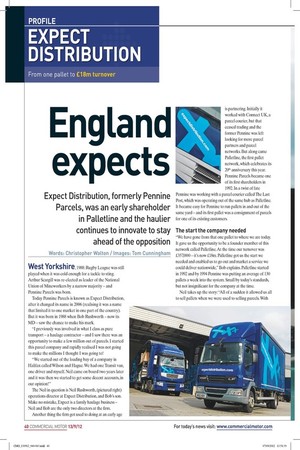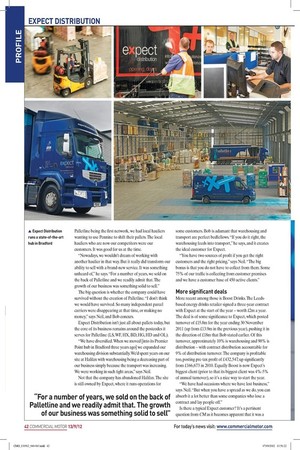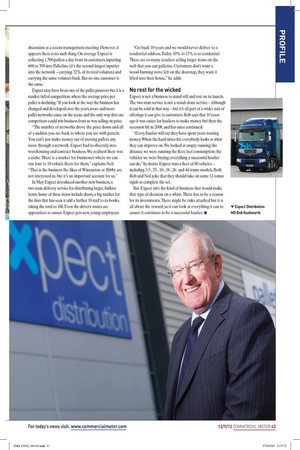England expects
Page 25

Page 27

Page 28

If you've noticed an error in this article please click here to report it so we can fix it.
Expect Distribution, formerly Pennine Parcels, was an early shareholder in Palletline and the haulier continues to innovate to stay ahead of the opposition
Words: Christopher Walton / Images: Tom Cunningham West Yorkshire, 1988: Rugby League was still played when it was cold enough for a tackle to sting. Arthur Scargill was re-elected as leader of the National Union of Mineworkers by a narrow majority – and Pennine Parcels was born.
Today Pennine Parcels is known as Expect Distribution, after it changed its name in 2006 (realising it was a name that limited it to one market in one part of the country). But it was born in 1988 when Bob Rushworth – now its MD – saw the chance to make his mark.
“I previously was involved in what I class as pure transport – a haulage contractor – and I saw there was an opportunity to make a few million out of parcels. I started this parcel company and rapidly realised I was not going to make the millions I thought I was going to!
“We started out of the loading bay of a company in Halifax called Wilson and Hague. We had one Transit van, one driver and myself. Neil came on board two years later and it was then we started to get some decent accounts, in our opinion!” The Neil in question is Neil Rushworth, (pictured right) operations director at Expect Distribution, and Bob’s son. Make no mistake, Expect is a family haulage business – Neil and Bob are the only two directors at the irm.
Another thing the irm got used to doing at an early age
is partnering. Initially it worked with Connect UK, a parcel courier, but that ceased trading and the former Pennine was left looking for more parcel partners and parcel networks. But along came Palletline, the irst pallet network, which celebrates its 20th anniversary this year. Pennine Parcels became one of its irst shareholders in 1992. In a twist of fate
Pennine was working with a parcel courier called The Last Post, which was operating out of the same hub as Palletline. It became easy for Pennine to run pallets in and out of the same yard – and its irst pallet was a consignment of parcels for one of its existing customers.
The start the company needed
“We have gone from that one pallet to where we are today. It gave us the opportunity to be a founder member of this network called Palletline. At the time our turnover was £357,000 – it’s now £18m. Palletline got us the start we needed and enabled us to go out and market a service we could deliver nationwide,” Bob explains. Palletline started in 1992 and by 1994 Pennine was putting an average of 130 pallets a week into the system. Small by today’s standards, but not insigniicant for the company at the time.
Neil takes up the story: “All of a sudden it allowed us all to sell pallets when we were used to selling parcels. With Palletline being the irst network, we had local hauliers wanting to use Pennine to shift their pallets. The local hauliers who are now our competitors were our customers. It was good for us at the time.
“Nowadays, we wouldn’t dream of working with another haulier in that way. But it really did transform our ability to sell with a brand-new service. It was something unheard of,” he says. “For a number of years, we sold on the back of Palletline and we readily admit that. The growth of our business was something solid to sell.” The big question is whether the company could have survived without the creation of Palletline. “I don’t think we would have survived. So many independent parcel carriers were disappearing at that time, or making no money,” says Neil, and Bob concurs.
Expect Distribution isn’t just all about pallets today, but the core of its business remains around the postcodes it serves for Palletline (LS, WF, HX, BD, HG, HD and OL).
“We have diversiied. When we moved [into its Premier Point hub in Bradford three years ago] we expanded our warehousing division substantially. We’d spent years on our site at Halifax with warehousing being a decreasing part of our business simply because the transport was increasing. We were working in such tight areas,” says Neil.
Not that the company has abandoned Halifax. The site is still owned by Expect, where it runs operations for some customers. Bob is adamant that warehousing and transport are perfect bedfellows. “If you do it right, the warehousing feeds into transport,” he says, and it creates the ideal customer for Expect.
“You have two sources of proit if you get the right customers and the right pricing,” says Neil. “The big bonus is that you do not have to collect from them. Some 75% of our trafic is collecting from customer premises and we have a customer base of 450 active clients.”
More significant deals
More recent among those is Boost Drinks. The Leedsbased energy drinks retailer signed a three-year contract with Expect at the start of the year – worth £2m a year. The deal is of some signiicance to Expect, which posted turnover of £15.8m for the year ending 30 November 2011 (up from £13.9m in the previous year), pushing it in the direction of £18m that Bob stated earlier. Of this turnover, approximately 10% is warehousing and 90% is distribution – with contract distribution accountable for 9% of distribution turnover. The company is proitable too, posting pre-tax proit of £432,547, up signiicantly from £166,673 in 2010. Equally Boost is now Expect’s biggest client (prior to that its biggest client was 4%-5% of annual turnover), so it’s a nice way to start the year.
“We have had occasions where we have lost business,” says Neil. “But when you have a spread as we do, you can absorb it a lot better than some companies who lose a contract and lay people off.” Is there a typical Expect customer? It’s a pertinent question from CM as it becomes apparent that it was a discussion at a recent management meeting. However, it appears there is no such thing. On average Expect is collecting 1,700 pallets a day from its customers, inputting 600 to 700 into Palletline (it’s the second-largest inputter into the network – carrying 7.2% of its total volumes) and carrying the same volumes back. But no one customer is the same.
Expect may have been one of the pallet pioneers but it is a market full of competition, where the average price per pallet is declining. “If you look at the way the business has changed and developed over the years, more and more pallet networks came on the scene and the only way that our competitors could win business from us was selling on price.
“The number of networks drove the price down and all of a sudden you are back to where you are with parcels. You can’t just make money out of moving pallets any more through a network. Expect had to diversify into warehousing and contract business. We realised there was a niche. There is a market for businesses where we can run four to 10 vehicle leets for them,” explains Neil. “That is the business the likes of Wincanton or Bibby are not interested in, but it’s an important account for us.” In May Expect introduced another new business, a two-man delivery service for distributing larger, bulkier items. Some of these items include doors, a big market for the irm that has seen it add a further 10 staff to its books, taking the total to 188. Even the drivers’ mates are apprentices to ensure Expect gets new, young employees. “Go back 10 years and we would never deliver to a residential address. Today 10% to 15% is to residential. There are so many retailers selling larger items on the web that you can palletise. Customers don’t want a wood-burning stove left on the doorstep, they want it lifted into their house,” he adds.
No rest for the wicked
Expect is not a business to stand still and rest on its laurels. The two-man service is not a stand-alone service – although it can be sold in that way – but it’s all part of a wider mix of offerings it can give to customers. Bob says that 10 years ago it was easier for hauliers to make money but then the recession hit in 2008, and has since continued.
“Every haulier will say they have spent years wasting money. When the hard times hit, everybody looks at what they can improve on. We looked at empty running; the distance we were running the leet; fuel consumption; the vehicles we were buying; everything a successful haulier can do,” he insists. Expect runs a leet of 80 vehicles – including 3.5-, 7.5-, 10-, 18-, 26and 44-tonne models. Both Bob and Neil joke that they should take on some 12-tonne rigids to complete the set.
But Expect isn’t the kind of business that would make that type of decision on a whim. There has to be a reason for its investments. There might be risks attached but it is all about the reward, so it can look at everything it can to ensure it continues to be a successful haulier. n




































